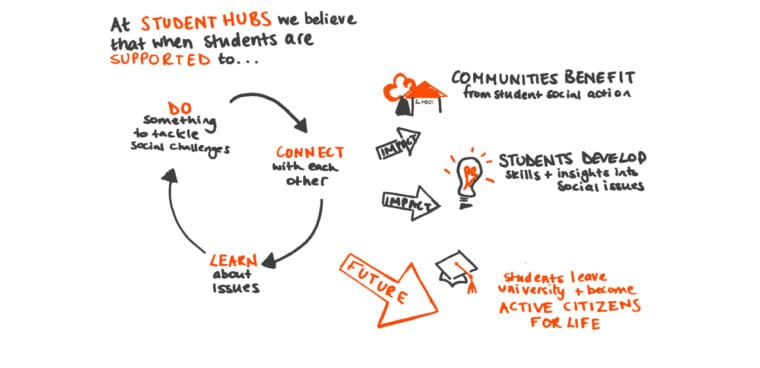Throughout our 15 year history we’ve worked to mainstream student social action. Read on for an overview of our story, or read our 15 year retrospective to bring our highlights from the past decade and a half to life.
From beginnings in oxford
Student Hubs started in 2007 when a group of students from Oxford university were inspired by the Cambridge Humanitarian Centre to connect students with social issues and provide spaces for students to work together and take action. Coming from an area with a high need for social action, but a lack of spaces for students to initially engage, Oxford Hub was created.
Our four founders set up Oxford Hub to provide a space for all socially active students to work together and support different organisations to tackle problems in and around Oxford. The Oxford Hub network worked with 44 student campaigning and volunteering groups at University of Oxford, developing weekly events and conferences supporting conversation around student social action.


To growth across the UK
Since 2008, our network has engaged with several institutions, including initial groups such as Bristol, Southampton and Cambridge, and then even more including Imperial, Winchester, Kingston, Oxford Brookes and Warwick. Our founders took dedicated time out of their studies to travel and build student networks across the UK that were passionate about a central space for social action and creating a difference, becoming Hub Ventures, one area at a time.
We started exploring different approaches to social action, such as Vice-Chancellor awards, the Social Enterprise Conference and building more connections with the community, including building a dedicated space in Oxford (the Turl Street Kitchen). In 2012, we started our first internal programme, Schools Plus, and in 2013 we became a national partner to start Student Volunteering Week and launched a second project, LinkAges!
To refining our approach
In 2014, we grew to include our first non-Russell Group universities, Winchester and Kingston, and piloted skilled placement opportunities such as the Social Innovation Programme focused on skill development within social action.
As we grew, we reflected on the need and engagement we wanted at Student Hubs. Through the many forms of activity and collaborative work we had done, we started to refine what we did, focusing more on our in-house programmes that tailored student volunteering to be a collaborative approach with the community. Our focus remained on building an impact for student social action, whilst supporting our local communities to thrive.

And continuing to work with students
Over the next 8 years, Student Hubs curated high-quality projects encompassing the double benefit model, including Climate Action Bristol, Branch Up, Community Engaged Learning and Empower. We engage with over 1,500 students across our Hubs on a yearly basis, supporting over 3000 community members in the process. We run regular One Community Forums to evaluate and develop the needs of our students and communities. In 2019, Oxford Hub in Turl Street Kitchen became a separate charity to Student Hubs, focusing more on community rather than student engagement as the primary drive.
Currently we engage students in three local areas with long-standing Hubs; Bristol, Cambridge and Southampton. We have also been delivering place-based projects to support student social action at other institutions, including a One Community Forum in Leeds Conservatoire and University College Birmingham, and a six-week Engage for Change project at the Open University in Wales.
Over the years, the one thing that’s always stayed the same is our person-centred approach. We know that building strong relationships is key to empowering active citizens and having a true impact in our communities. Thank you to everyone who has been involved in our work, you have certainly made your mark.
